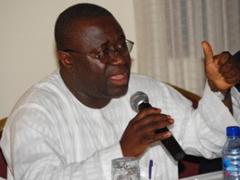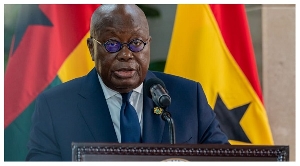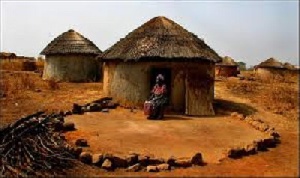- Home - News
- TWI News | TV
- Polls
- Year In Review
- News Archive
- Crime & Punishment
- Politics
- Regional
- Editorial
- Health
- Ghanaians Abroad
- Tabloid
- Africa
- Religion
- Election 2020
- Coronavirus
- News Videos | TV
- Photo Archives
- News Headlines
- Press Release
Politics of Thursday, 31 May 2012
Source: GNA
Intemperate language suggests that violence is legitimate - Dr Aning

Dr Emmanuel Kwesi Aning, Director of Research at the Kofi Annan International Peace Training Center (KAIPTC), has noted that political violence does not happen out of a vacuum and that intemperate language suggests that violence is legitimate.
Talking to the Ghana News Agency at a press soiree organized by KAIPTC in Accra, Dr Aning said whenever there had been a "seemingly sudden" outburst of violence in a country, it was often the result of a gradual nurturing process which finally culminated into a sudden explosion.
He said although it might not be obvious to some, there was presently a situation which to a large extent did not facilitate peace in the country.
Dr Aning said the nature of discussions highlighted by the media, considering the fact that they were typified by insults and hostility was building a tense atmosphere politically which was not healthy for the stability and progress of the country.
"Bad language builds the notion in the sub-conscious mind that violence is legitimate," he said.
Dr Aning said there was the need for key stake-holders in the nation's affairs to appreciate the fact that peace-building was only effective when it was done in a preventive manner.
He said it was important to realize that what was fed into the psyche of the population politically played a strong part in determining the political stability of a nation.
Brig. Gen, Benjamin Freeman Kusi, Deputy Commandant of the KAIPTC, commenting on some recent developments in the country, said it was important for the citizenry to realize that members of the armed forces and security agencies should under no circumstances be dragged into politics.
"The armed forces as well as other security agencies are only loyal to the state and this is what must be realized and appreciated by all," he said.
Brig. Gen. Kusi said the ability of the security agencies and the armed forces to remain responsive to their role of being responsible for the security of the state was key to ensuring the political stability of any nation.
In a related story, the Christian Council of Ghana (CCG) has inaugurated an Eminent Group of Persons for election 2012, "to provide a clear neutral voice of moderation and leadership to foster peaceful elections".
A release signed by Rev Dr Fred Deegbe, General Secretary of the CCG, said it was worth noting that the 2008 general election was characterized by heightened tension and desperation as the nation was drifting towards violence.
It said in response to the situation, some eminent religious leaders and selected key players in civil society, of which CCG played a key role, came together to work towards peace.
"This timely intervention behind the scenes by these persons was critical in sustaining peace for Ghana," the release said.
It said guided by the above experiences, the council deemed it imperative to be proactive in ensuring that the circumstances and incidents that fueled the tensions during the 2008 elections, were not repeated in election 2012.
The release said in the same spirit, the council in being responsive to the "prophetic mandate", had inaugurated an eminent group for election 2012.
It said the 14 member group was co-chaired by Pastor Mensa Otabil, General Overseer of the Central Gospel Church and Prof Marian Ewurama Addy, a Professor of Biochemistry and chairman of the Policy Committee on Developing countries, with Rev Fred Deegbe, General secretary of the Christian Council as the Executive Secretary.
The group would solicit commitment from political parties to focus on issue based discussions and also reduce inflammatory and divisive language by political activists, the release said.
It said the council would also encourage accurate media reportage and ensure a smooth transitional process.**










